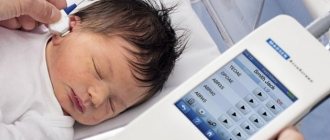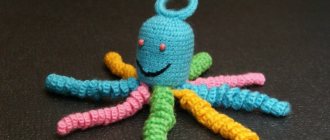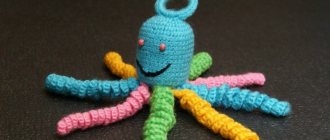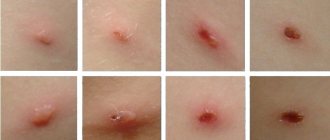April 04, 2019
Timely hearing screening during the newborn period is important from both a medical and social point of view. After all, hearing loss in a child leads to disturbances in the development of his speech, as well as to deviations in the formation of intelligence and personality in general.
Victoria Khalimovskaya talks about the methods of testing infants' hearing by doctors and parents at home, as well as what the baby's parents can and should do to avoid hearing impairment in the child .
First hearing test for a newborn - in the maternity hospital
The formation of the fetal hearing organ begins from the fifth week of intrauterine life and continues throughout the entire period of pregnancy.
Fun fact: By the 20th week of pregnancy, the fetal inner ear has matured to the size of an adult inner ear.
Audiological screening is carried out for all newborns in maternity hospitals using the OAE (otoacoustic emission) method, which can detect even slight hearing loss. If for some reason screening was not carried out in the maternity hospital (this happens, for example, if a newborn was transferred to intensive care immediately after birth), then an audio test is performed on such children at the age of 1 month. Repeatedly at the age of three months.
When and why should children have their hearing checked?
Why should children have their hearing checked and when should it be done?
The author of the article is Ekaterina Dovlatova, ENT doctor at the DocDeti clinic.
Hearing is very important for speech development and the development of thought processes in a baby. Particular attention must be paid to hearing in the first year of life, and if there is suddenly hearing loss, then begin to solve the problem as soon as possible.
Babies cannot tell about the presence of hearing problems; for this, it is important to carry out early diagnosis in the first three months of life.
In our country, the state has been operating since 2008. newborn audiological screening program, it includes 2 stages:
1. Screening. In the maternity hospital, hearing tests are carried out on each born child on the 3rd-4th day of life. The method of recording evoked otoacoustic emissions (EOAE) is used. According to the recommendations, screening should be performed on a sleeping child, 30-40 minutes after feeding.
The results can be the following: “pass” (pass) or “fail” (refer). When the test is not carried out in the maternity hospital or the result is “failed”, it must be repeated at 4-6 weeks in the clinic.
2. Diagnostics. Children under 3 months must complete this stage if the first stage has not been passed or there is a risk factor for hearing loss. To do this, you should contact an audiology center. During diagnosis, short-latency auditory evoked potentials (SLEPs) are used. This method is more sensitive and specific, but requires time, sophisticated equipment and an experienced specialist.
If there is no hearing loss based on the results of the second stage, there is no need to do anything else. If the problem is confirmed, you need to start an individual rehabilitation program before the age of 6 months.
Most often it consists of:
- Medical care (conservative and/or surgical treatment)
- Psychological and pedagogical assistance
- Hearing aids (hearing aids for one or both ears)
- Cochlear implantation (suitable age from 10 to 18 months). During this operation, a system of electrodes is inserted into the baby's inner ear, which transmit sounds in the form of weak electrical impulses directly to the auditory nerve. But sound is perceived differently than by a healthy ear, and it is important to undergo subsequent auditory-speech rehabilitation.
Risk factors for the development of hearing loss in newborns include:
1. Hereditary syndromes associated with hearing loss.
2. sensorineural hearing loss in childhood in close relatives.
3. Congenital anomaly of the development of the face or skull (cleft anomalies of the external ear, etc.)
4. Infection with intrauterine infection (torch-cytomegalovirus, herpes, rubella, syphilis and others), and infections suffered after birth (meningitis).
5. Situations that require newborns to stay in the intensive care unit for more than five days (in Russian recommendations, more than two days)
6. The presence of severe hyperbilirubinemia (when a blood transfusion is required) or a course of ototoxic drugs.
7. Extreme prematurity (up to 32 weeks) or very low birth weight (up to 1.5 kg), birth asphyxia, below 6 Apgar scores at the fifth minute.
Under mom's control
If audiological screening was not carried out in the maternity hospital for some reason, but you suspect that your child is hard of hearing, check the baby’s hearing at home (no earlier than 5 days after birth). To do this, discreetly clap your hands next to the baby's ear. The sound should not be too loud. Do the test first on the right ear, then on the left ear.
A child’s lack of response to a home hearing test is a reason for an immediate visit to the doctor!
But keep in mind that premature babies' hearing develops later. If your baby was born prematurely, undergo a full examination to rule out pathologies.
The hearing aid develops in such a way that in the first days of life the baby reacts only to certain vibrations and sharp sounds. He does not pay attention to minor noises in a calm environment. By one month, hearing is fully developed. The following signs indicate this:
- The baby begins to hear and recognize some sounds.
- At the end of the second month, he recognizes his mother by ear and gets used to the voices of other loved ones.
- By 4 months, the baby consciously turns its head towards the sound sources.
- By six months, the baby responds to its name and responds in a unique way with movements. He can smile if you talk to him.
What is audio screening? When is a newborn baby's hearing checked?
Audio screening is a procedure for examining the hearing analyzer of a newborn baby and children up to six months. The massive introduction of hearing testing within the walls of government institutions of the Russian Federation occurred not so long ago, in 2008. Although it should be documented to be implemented since 1996, in accordance with the order of the Ministry of Health.
The study is carried out in two stages; the first - within the walls of the maternity ward 2-3 days after the birth of the baby, and the second - within the walls of the children's clinic a few days after discharge.
Audiometry is, without exaggeration, the most effective way to determine auditory dysfunction at an early age.
Under medical supervision
Some children are advised to be closely monitored by an otolaryngologist. This “risk group” includes children who have the following characteristics:
- the baby has been diagnosed with developmental defects;
- there is a genetic predisposition to deafness in the family;
- the baby had low birth weight;
- the child was born in a state of asphyxia (lack of oxygen during childbirth);
Features of hearing testing in premature babies
The procedure for examining the auditory analyzer of full-term and premature babies does not differ significantly. The only differences are in the timing of audio screening.
Due to the morphophysiological immaturity of the systems, examination of babies born ahead of schedule is carried out somewhat later. Children born before 32 weeks inclusive are examined at 2-6 weeks of life, depending on their general health.
For babies born between 33 and 37 weeks of pregnancy, screening is carried out in the second or first week of life. But repeated hearing screening of a premature baby is scheduled at the same time.
PARENTS AND CHILDREN. Psychology of child development from birth to one year.
The child’s psyche begins to form in the womb and continues to develop after birth. It is the first year of life that plays the most important role in the formation of not only the physical, but also the psychological and emotional state of your child. To provide him with a developmental environment, you need to understand the peculiarities of the development of the newborn’s psyche.
CONSULTATION WITH A CHILD PSYCHOLOGIST
231-22-80; 231-22-87; 993-22-48.
Features of the psyche of newborns
After birth, the baby is helpless, his brain is not fully formed, so only reflexes help him survive: food and unconditioned, indicative and protective. After a couple of weeks, conditioned reflexes begin to form, for example, when the mother takes the baby in her arms and positions him for feeding.
As the infant's cerebral cortex continues to form, his psyche is subordinate to the subcortical centers. In this regard, the physical sensations of a newborn are directly related to his emotions. The baby is not aware of the boundary between his body and the world around him. To develop the cerebral cortex of a newborn, exercises for fixing the gaze using bright rattles of rather complex shapes are recommended.
Important milestones in the development of newborn children are the manifestations of auditory and visual concentration in response to communication with mother or other relatives. The culmination of infancy is the “revitalization complex.” This is a vivid emotional reaction to the mother’s approach, which includes concentrating the gaze on the mother’s face, smiling and active movements of the arms and legs. At this point, the newborn period ends, and the stage of infancy begins, marking the child’s need to communicate with adults.
Infant need for communication
Infancy begins in the second or third month of a newborn's life, when he begins to master communication skills with adults. The complex of revival at the sight of the mother evolves and becomes more violent, and after the baby reaches four months of age, it gradually fades away. The revitalization complex performs two functions at once.
- it serves as a response to the approach of an adult.
- it serves to actively attract the mother's attention when the baby needs communication.
At this stage, the baby perceives the mother as a whole person, regardless of her clothes, mood, actions and other signs. A baby's love for his mother is unconditional, since the child loves her not for her actions, but for the fact that she is in his life. Remember that during this period, a lack of emotional and physical contact with the mother can lead to serious delays in the child’s psychological development.
During the first half of life, the baby learns new ways of communicating with people around him. At the same time, he uses all the methods available to him to attract the attention of an adult. The baby does not yet distinguish between intonations and corresponding emotions directed at him, therefore he reacts exclusively positively to any communication with his mother. The only reason for whims and crying at this age may be a lack of attention and care from adults.
Communication with mother and other adults has a huge impact on the development of the baby’s psyche. He begins to recognize himself as an independent being, thanks to which his sense of self is formed, which will later develop into self-awareness. It is positive emotional communication with adults that becomes the basis for further progress. In particular, children's desire to understand the world around them, starting with nearby objects, intensifies. When the baby develops an interest in various objects and develops a grasping reflex, the first half of infancy is considered complete.
Development of self-awareness and speech in an infant
By six months, the baby begins to actively explore the world through surrounding objects, and at the same time his attitude towards adults changes. If earlier the baby had enough attention and affection, now he craves joint productive activities. The adult is seen as a play partner, while the baby gets much more pleasure from active joint activities. If the mother simply watches the baby from the side, the baby performs much fewer specific actions, which means its development occurs more slowly. The child’s progress is more noticeable the more effectively his cooperation with adults occurs, and the stronger the emotional connection between them becomes.
At the same time, at this stage the child’s emotions also change. In addition to a positive reaction to an adult, he also has a whole range of negative emotional manifestations. The baby learns to be angry, sad, sad, and irritated. At the same time, the baby remains attached to close relatives, but is distrustful of strangers, sometimes even afraid of them.
The second half of the baby’s year is especially important because at this age preparation for active speech occurs. The baby's hearing improves, he babbles a lot and tries to imitate the sounds made by those around him. That’s why it’s so important to constantly talk to your baby, read him books, poems, and sing simple songs. The more the baby hears his mother’s speech, the faster he will learn to speak and the more actively his vocabulary will be replenished. Psychologists recommend having “conversations” with the child, responding to his babbling and voicing his actions so that he learns to associate individual words with objects. If you live in a bilingual environment or want to quickly start teaching your baby a foreign language, introduce your baby to both languages from the first days. As early as eight months, children lose the ability to recognize sounds that are not used in their native language.
By their first birthday, babies already have an idea of themselves; they can recognize their reflection in the mirror. Through active play activities and frequent contact with adults, children begin to understand that they can influence the environment through their own activity.
It is the infant’s increased self-awareness that causes the crisis of the first year, which ends the stage of infancy and marks the beginning of early childhood. The first age crisis is based on the confrontation between the child’s desire for independence and the awareness of one’s helplessness in the absence of adults.
During the first six months, communication with the mother, her affection and undivided attention is vital for the baby; later, the need for joint activities, as well as preparation for active speech, becomes apparent. To ensure the correct emotional and psychological development of a child from birth to one year, it is important to talk and play with the baby, give him enough attention, care and affection.
Source: https://viline.tv/deti/article
What does the baby hear?
In the first week of life, the child hears only close and loud sounds.
He does not perceive them as clear because the ear is not yet developed enough.
Gradually, the baby begins to respond more actively to voices, especially the mother’s, as they are able to calm and help them feel safe.
The main reactions to the correct development of hearing in a newborn include:
- turning your head in the direction of the noise.
- searching with the eyes for the source of the sound.
- crying, both strong and sobbing.
- intense movements of arms and legs.
- freezing and listening.
Attention! Experts do not recommend playing loud music for children, raising your voice at them, or visiting places with them where it can be very noisy. This can significantly affect hearing development.
What factors can lead to hearing loss?
There are two main classifications of hearing loss in children: hearing loss and deafness. By their nature they can be hereditary, natural or acquired. There are several reasons for the development of these pathologies:
- viral diseases or infections.
- difficult period of pregnancy for the mother.
- the use of harmful or toxic substances during pregnancy.
- heredity.
- various genetic mutations.
- diseases of the ENT organs, for example, adenoids.
The danger of hearing impairment lies primarily in the fact that there may be a delay in the psychological or intellectual development of the child, which is why the baby will not be able to live a full life.
How does a baby hear?
During the first month of development, children are able to hear only loud sounds, but after this period of time, they begin to distinguish and respond to various voices and other extraneous sounds. To understand that your child is beginning to hear well, you should pay attention to the following signs:
- Depending on the speed of speech, the child can behave actively or calmly;
- Intonation - an angry voice can upset the baby, but a gentle one, on the contrary, will calm and delight;
- There is a division into sounds that are liked and those that are not liked.
Often newborn babies can get carried away by one object that makes a pleasant sound for them, for example, a rattle. Then they may stop paying attention to other noises for a while, but this is quite natural and passes quickly.











